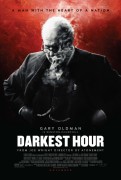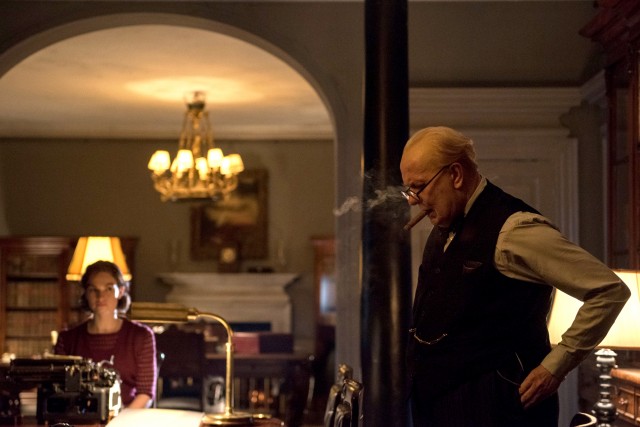Darkest Hour Movie Review
 |
Darkest Hour
Theatrical Release: November 22, 2017 / Running Time: 125 Minutes / Rating: PG-13 Director: Joe Wright / Writer: Anthony McCarten Cast: Gary Oldman (Winston Churchill), Kristin Scott Thomas (Clementine Churchill), Lily James (Elizabeth Layton), Stephen Dillane (Viscount Halifax), Ronald Pickup (Neville Chamberlain), Samuel West (Sir Anthony Eden), Ben Mendelsohn (King George VI), Richard Lumsden (General Ismay), Malcolm Storry (General Ironside) |
Darkest Hour is set in May of 1940. Nazi Germany has invaded much of Europe and the United Kingdom is in their path. Written by Anthony McCarten and directed by Joe Wright, Darkest dramatizes in detail the pivotal month, with seasoned actor Gary Oldman transforming himself physically to portray the frank, portly leader. It is a career performance of sorts for Oldman, the respected Englishman who has been acting in film for over thirty years, often to acclaim but only once to an Academy Award nomination (2011's Tinker Tailor Soldier Spy). That apparent overdue narrative seemed to have pushed Oldman into frontrunner status before this film had even been seen.
Wright has twice steered films to Best Picture nominations in 2005's Pride & Prejudice and 2007's Atonement. Unlike those films, Darkest Hour is less than the sum of its parts. In fact, it's a really good performance, but not a really good movie. That mix recalls another film about a prime minister: The Iron Lady (2011), which won Meryl Streep her third Oscar despite mixed and underwhelming reviews as a whole.
Churchill is difficult. He bristles at a typist (Lily James) who initially appears to be our point of entry but fades, for not double spacing his dictation. He clashes with "Bertie", King George VI (Ben Mendelsohn), the stammering royal at the center of The King's Speech. He clashes with Chamberlain ally Viscount Halifax (Stephen Dillane), who wants him gone. He inadvertently flashes the "up your bum" sign up to a newspaper photographer rather than the intended V for Victory. And he has little regard for trying to negotiate peace, preferring to exert the UK's military might and exploit the nation's geographical advantages.
If you're a history buff who is fascinated by the strategies and policies employed by the UK nearly eighty years ago, you may find Darkest Hour riveting. If not, then it will be a very long two hours plus credits to endure. It is not surprising but plenty impressive that Oldman can disappear in the lead role. Some viewers may be shocked to discover that that is Sirius Black and Commission Gordon under the lifelike jowls and thinning hair. It can be hard to find the personality and accessibility in history. The film's repeated references to the Dunkirk evacuation reminded me that those were measures by which Christopher Nolan's summer blockbuster left me cold. Whereas Dunkirk focused on action and failed to connect with me on an emotional level, Darkest Hour avoids action and focuses almost entirely on men talking. The problem is if what they're talking about isn't interesting or relevant, what is there to take away from the film, except the fact that Gary Oldman is finally living up to his surname? A good performance can't really transcend a subpar movie and this is the issue that sinks Darkest Hour and makes me want nothing to do with any year-end recognition it may receive, even lifetime achievement-type Oldman accolades.
|
Related Reviews:
DVDizzy.com | DVD and Blu-ray Reviews | New and Upcoming DVD & Blu-ray Schedule | Upcoming Cover Art | Search This Site
DVDizzy.com Top Stories:
Now in Theaters: Roman J. Israel, Esq. • The Disaster Artist • The Post • Lady Bird • The Man Who Invented Christmas • The Greatest Showman
Dunkirk • The Iron Lady • The King's Speech
Gary Oldman: Bram Stoker's Dracula • State of Grace • Red Riding Hood • Paranoia • The Space Between Us
Kristin Scott Thomas: Richard III • The Invisible Woman • Four Weddings and a Funeral • Only God Forgives
Lily James: Baby Driver • Cinderella (2015) | Stephen Dillane: Secret State • The Greatest Game Ever Played
Text copyright 2017 DVDizzy.com. Images copyright 2017 Focus Features, Perfect World Pictures, and Working Title Films.
Unauthorized reproduction prohibited.
